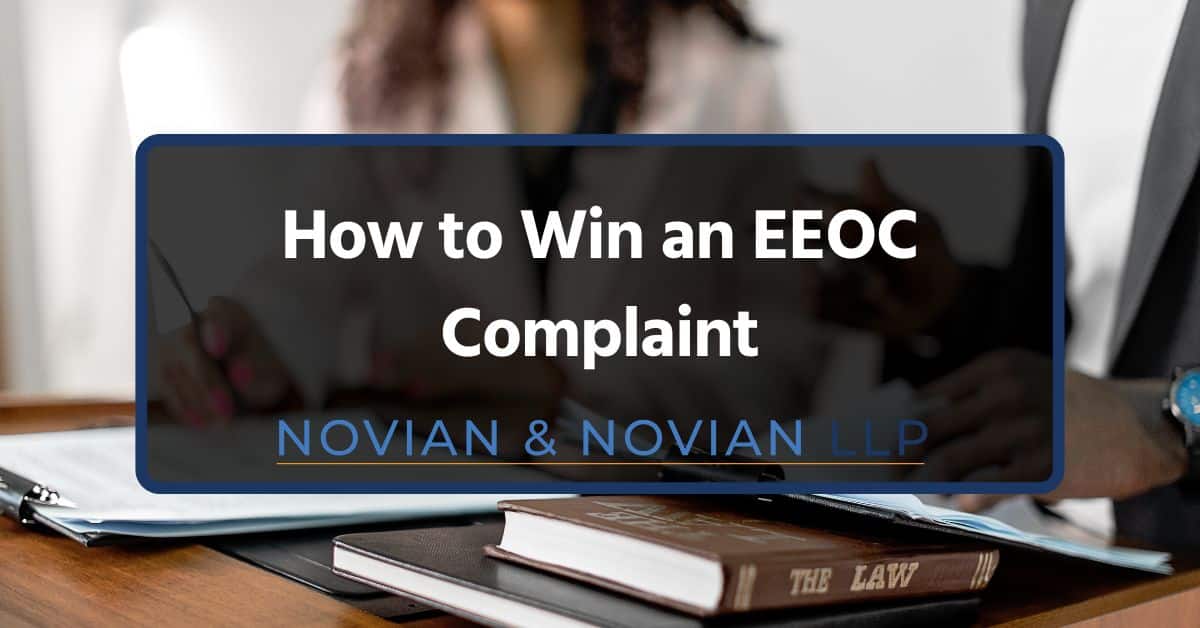An EEOC complaint is a formal charge filed with the U.S. Equal Employment Opportunity Commission (EEOC) by an employee or job applicant who believes they’ve been discriminated against at work. This discrimination may be based on race, color, religion, sex, pregnancy, national origin, age (40 or older), or disability. All these are protected categories under federal employment law.
To successfully win or resolve an EEOC complaint as an employer, you must act immediately. It is helpful to hire an experienced lawyer, preserve all relevant evidence, submit a strong position statement, and fully cooperate with the EEOC.
Facing an EEOC complaint is stressful, but you don’t have to navigate it alone. Our experienced California employment lawyers at Novian & Novian have over 35 years of experience, and are here to help protect your rights, your reputation, and your business. Request your free consultation today to speak with a dedicated employment attorney.
This post will provide a clear overview of an EEOC complaint and a step-by-step strategy for handling, responding to, and resolving one.
Table Of Contents
- What Is an EEOC Complaint Process and Why Does It Matter?
- 4 Tips on How to Win an EEOC Complaint as an Employer
- What to Do After Receiving an EEOC Complaint
- The Potential Impact of an EEOC Complaint on Your Business
- EEOC Mediation and Settlements: Strategic Considerations
- Common Employer Mistakes in EEOC Cases
- Navigate Your EEOC Case With Confidence!
- FAQs
What Is an EEOC Complaint Process and Why Does It Matter?

The Equal Employment Opportunity Commission (EEOC) is the federal agency responsible for enforcing anti-discrimination laws in the workplace. An EEOC complaint, formally known as a “charge of discrimination,” is a legal claim filed by an employee or job applicant who believes they have experienced unlawful discrimination at work. This can involve being treated differently based on race, sex, age, disability, national origin, religion, genetic information, or other protected characteristics under federal employment law.
The complaint process typically begins when an individual files an initial complaint with the EEOC’s office. From there, the agency may pursue mediation, launch a formal investigation, request witness statements and relevant documents, and ultimately determine whether discrimination likely occurred. If the EEOC determines there is reasonable cause, the employer may face serious consequences, including lawsuits, mandatory corrective action, and costly settlements in federal court.
For employers, the stakes are high. An EEOC case can damage company morale, attract negative public attention, and create financial burdens that extend far beyond legal fees. Failing to respond properly to an EEOC complaint can also result in the loss of credibility before federal operations and civil rights agencies.
What Employers Can Be Sued for Under the EEOC
Under the laws enforced by the EEOC, employers can be sued for several types of alleged discrimination and employment violations. One of the most common EEOC complaint categories is discrimination claims. For example, age discrimination claims often arise when older workers feel they’ve been passed over for promotions or unfairly terminated due to their age.
Another frequent basis for EEOC complaints is retaliation. If an employee files a complaint, participates in an investigation, or supports a co-worker’s claim and then suffers a demotion, termination, or other adverse job action, they may claim retaliation. This type of EEOC case is particularly dangerous for employers because retaliation can be easier to prove than the original allegation of discrimination.
Harassment is also a major issue under the Equal Employment Opportunity Commission. Harassment, including sexual harassment in the workplace and other forms of hostile work environment, can lead to significant legal exposure. When employers fail to take prompt corrective action or ignore complaints from workers and co-workers, they open the door to liability.
In addition, failure to provide reasonable accommodations for disabilities or religious practices is another area where employers face EEOC scrutiny. Under federal employment law, workers have the right to request accommodations for physical or mental disabilities and religious beliefs. Denying or ignoring those requests without proper justification may lead to an EEOC complaint and legal action.
Unequal pay is yet another reason employers may face lawsuits. Under the Equal Pay Act, employees are entitled to receive equal compensation for equal work, regardless of gender. If women in your organization are paid less than men in similar positions with the same responsibilities, that wage disparity can become the basis for an EEOC complaint and even escalate into class-action litigation.
4 Tips on How to Win an EEOC Complaint as an Employer
Winning an EEOC complaint as an employer is not about luck; it’s about preparation, professionalism, and proactive legal strategy. When an employee or job applicant files a discrimination charge with the Equal Employment Opportunity Commission (EEOC), the stakes are high. Employers must understand the EEOC complaint process, know their legal obligations under federal employment law, and take smart, timely action to protect their position.
Below are several actionable tips that can significantly improve an employer’s chances of reaching a successful outcome in an EEOC case:
Act Quickly and Strategically
When an initial complaint is filed with the EEOC’s office, time is of the essence. Employers are subject to strict time limits to respond and participate in the EEOC complaint process.
A swift, strategic response allows you to control the narrative, gather evidence early, and avoid appearing disorganized or uncooperative. Delays or vague answers may lead the EEOC to believe that the employer has something to hide, making it more likely that the agency will proceed with a formal investigation or move the case to federal court.
Early in the complaint process, it is critical to review all relevant facts, assess the position of all parties involved, and develop a plan to respond. This may involve collecting disciplinary records, reviewing internal communications, and consulting with department heads. Your goal is to present a clear and consistent defense that is grounded in documented facts, not assumptions or emotional reactions.
Gather Evidence and Maintain Thorough Documentation
One of the most important steps to win an EEOC complaint is to gather evidence and maintain thorough documentation. This includes performance evaluations, written statements from co-workers and supervisors, internal complaints, witness statements, discovery requests, and disciplinary records. Having well-organized records demonstrates that your business follows objective, consistent practices and helps rebut claims of unlawful discrimination, retaliation, or failure to provide reasonable accommodations.
Federal employees who file complaints may use emails, texts, or even personal devices as evidence that they were treated differently. Employers must ensure that their documentation can support their decisions and withstand scrutiny from both the EEOC and potentially a federal court. The more robust and relevant your documentation is, the stronger your legal position will be in the face of alleged discrimination.
Maintain Professionalism and Transparency
During an EEOC case, professionalism and transparency are essential. Whether you’re dealing with an EEOC mediator, investigator, or your own employees, how you communicate matters.
Employers should avoid making any retaliatory moves or appearing to take the complaint personally. The EEOC determines credibility not just through written statements and legal arguments, but also through how parties behave during the process.
Transparency in communication can also benefit your position. If mistakes were made, acknowledging them and offering corrective action can demonstrate good faith and potentially de-escalate the situation. Outright lies, evasive answers, or attempts to destroy relevant documents can backfire and result in harsher consequences under federal operations.
Train Staff and Reinforce Company Policies
One of the most effective ways to prevent workplace discrimination claims and EEOC complaints is through staff training and clear internal policies. Training ensures employees understand their rights and responsibilities under anti-discrimination laws, including the Civil Rights Act, Equal Pay Act, and Americans with Disabilities Act. It also helps managers to recognize and properly respond to potential violations.
Make sure your employee handbook outlines your organization’s policies on harassment, retaliation, reasonable accommodations, and disciplinary procedures. When employees are trained to identify what constitutes inappropriate behavior or unlawful discrimination, they’re more likely to report issues internally, before they escalate to an EEOC complaint.
Involve an Employment Lawyer in the Process
The most critical step to win an EEOC complaint is to work with an experienced employment lawyer as early as possible. Legal counsel can help you draft a compelling position statement, respond to discovery requests, gather evidence, and represent you during EEOC mediation or a formal investigation. Lawyers also advise you on whether to settle or proceed through the full legal process, based on the strength of your case.
Submitting documentation or communicating with the EEOC before speaking with an attorney can result in unintended admissions or incomplete arguments. An employment lawyer ensures that your response is legally sound, consistent with federal employment law, and aligned with the best strategy for your business. Contact us today to schedule your free consultation with a skilled employment attorney.
What to Do After Receiving an EEOC Complaint
Receiving an EEOC complaint can be a daunting moment for any employer, especially if the allegations involve serious claims such as age discrimination, retaliation, or violations of the Equal Pay Act. However, responding effectively begins with immediate, strategic action.
The Equal Employment Opportunity Commission (EEOC) enforces federal employment law and investigates claims of workplace discrimination. So, it is critical that employers take the complaint process seriously from the outset.
Here’s what to do once you’ve received notice of a discrimination charge from the EEOC’s office:
Review the Complaint Thoroughly
The first step is to carefully review the initial complaint. You need to understand exactly what the charging party is alleging. Then, pay close attention to the relevant facts, dates, and names of co-workers or supervisors mentioned. Identifying the scope and specifics of the discrimination charge allows you to begin forming a tailored, fact-based response and avoid generalizations that the EEOC may dismiss.
You should also consider the legal implications under federal operations and anti-discrimination laws, such as the Civil Rights Act, when analyzing the complaint. A misstep at this stage such as overlooking key allegations or failing to recognize potential EEOC mediation opportunities can lead to a formal investigation and even escalation to federal court.
Identify Relevant Documents and Communication
Once the claims are clearly understood, the next step is to gather evidence that supports the employer’s position. This includes compiling relevant documents such as performance evaluations, disciplinary records, written statements, employment contracts, and internal communications. Emails, text messages, personal devices, and discovery requests may all become part of the investigation if the charging party claims they were treated differently than other employees.
The EEOC often requests a wide range of documentation during the EEO process, especially in cases involving federal employees. Accurate and thorough documentation is essential not just to refute alleged discrimination but also to demonstrate the employer’s compliance with workplace policies and reasonable accommodation requirements. Failing to gather and submit relevant documents can significantly hurt your ability to win an EEOC complaint.
Notify and Prepare Relevant Personnel
Employers must notify and prepare key personnel who may be involved in the EEOC case. This includes HR managers, supervisors, department heads, and others who may have interacted with the charging party or possess critical knowledge of the situation. These individuals may need to assist with gathering documents, drafting written statements, or participating in interviews as part of the legal process.
All parties involved should be reminded of their obligation to maintain confidentiality and professionalism throughout the EEOC complaint process. Any perceived retaliation against the charging party could not only undermine your defense but also lead to additional legal exposure under federal employment law. It’s also important to avoid any outright lie or attempt to conceal other evidence, as these actions can severely damage credibility.
The Potential Impact of an EEOC Complaint on Your Business
An EEOC complaint can have serious legal, financial, and reputational consequences for any employer. Once a discrimination charge is filed with the Equal Employment Opportunity Commission (EEOC), your business enters a complex legal process governed by federal employment law and anti-discrimination laws, including the Civil Rights Act, the Equal Pay Act, and laws protecting against age discrimination, national origin bias, and disability-based discrimination. Even if the complaint is ultimately dismissed, the toll it can take on your resources and reputation can be significant.
The most damaging outcome is litigation in federal court, which can be both financially draining and reputationally devastating. Legal fees can quickly escalate, especially if you’re unprepared or lack legal counsel. Failing to respond proactively can also increase the likelihood of losing in court.
The worst-case scenario includes not only a legal judgment but also public exposure, regulatory scrutiny, and long-term brand damage. This is why employers must treat every EEOC complaint with seriousness. This includes responding swiftly, gathering evidence, consulting with an employment lawyer, and aiming for a successful outcome.
EEOC Mediation and Settlements: Strategic Considerations
Mediation is often a critical part of the EEOC complaint process and can offer a path to resolution without the need for prolonged litigation. Employers should seriously consider mediation when the facts of the case are disputed but not irreconcilable, when there’s a desire to maintain a professional relationship with the charging party, or when the legal and reputational risks of continuing are high. Participating in EEOC mediation shows the agency that your business is open to a resolution and may help avoid deeper scrutiny during a formal investigation.
Determining whether to accept a settlement offer or defend the case in court requires careful evaluation. A settlement can help control costs, limit public exposure, and close the matter efficiently.
On the other hand, defending the case may be necessary if the allegations are unfounded, the legal exposure is minimal, and your documentation is solid. Employers should consult experienced legal counsel to assess potential outcomes, legal strategy, and long-term implications.
Common Employer Mistakes in EEOC Cases
One of the most damaging errors an employer can make is delaying or ignoring an EEOC complaint. Time limits are strict, and the EEOC takes non-responsiveness seriously. Ignoring a complaint can trigger an automatic escalation to a formal investigation or even default judgments in federal court. Even if you believe the allegations are completely false, treating the process with professionalism and urgency is essential to win an EEOC complaint.
Another common mistake is poor record-keeping or maintaining inconsistent workplace policies. Employers who fail to preserve disciplinary records, performance evaluations, or emails often find themselves without the evidence needed to defend against a discrimination charge.
Likewise, if policies are applied unequally across employees or if there is a pattern of treating some workers differently, the EEOC may view this as evidence of bias. Establishing clear, well-documented practices that align with federal employment law helps avoid the perception of unlawful discrimination.
Lastly, attempting to manage the complaint without legal counsel is a major risk. The EEOC complaint process involves legal technicalities, deadlines, and documentation standards that most employers are not equipped to handle alone. Employment lawyers can help you respond to discovery requests, prepare witness statements, and defend your position in EEOC mediation or court. The cost of defending an employment lawsuit can be steep, but the cost of not having legal representation can be even higher, particularly if a case is lost or settles unfavorably due to avoidable errors.
Navigate Your EEOC Case With Confidence!
Facing an EEOC complaint can feel overwhelming, but with the right strategy, legal support, and mindset, employers can confidently manage the process and protect their business. Responding quickly, gathering relevant documents and witness statements, maintaining professionalism, and consulting experienced legal counsel are all critical components to winning an EEOC complaint.
It’s essential to treat every EEOC complaint with seriousness and professionalism. Avoid retaliation, maintain transparency, and ensure your actions align with anti-discrimination laws and federal employment law. Even in difficult moments, maintaining a respectful tone and a cooperative attitude with the Equal Employment Opportunity Commission helps preserve credibility and fosters a smoother legal process.
If your business is navigating the EEOC complaint process, don’t do it alone. Our attorneys at Novian & Novian are among the best employment attorneys in California and offer the guidance you need for a successful outcome. Schedule a free consultation today and take the first step toward resolving your case with clarity, compliance, and confidence.
FAQs
What Is The EEOC, And What Role Does It Play?
The Equal Employment Opportunity Commission (EEOC) is a federal agency that enforces laws prohibiting workplace discrimination based on race, sex, age, disability, national origin, and other protected characteristics. It investigates complaints, facilitates mediation, and may pursue legal action on behalf of employees if unlawful discrimination is found.
What Should I Do If An Employee Files An EEOC Complaint?
Immediately review the complaint, gather relevant documents and witness statements, and consult an experienced employment lawyer to prepare a timely, strategic response. Taking swift, professional action helps protect your business from legal and reputational risks.






